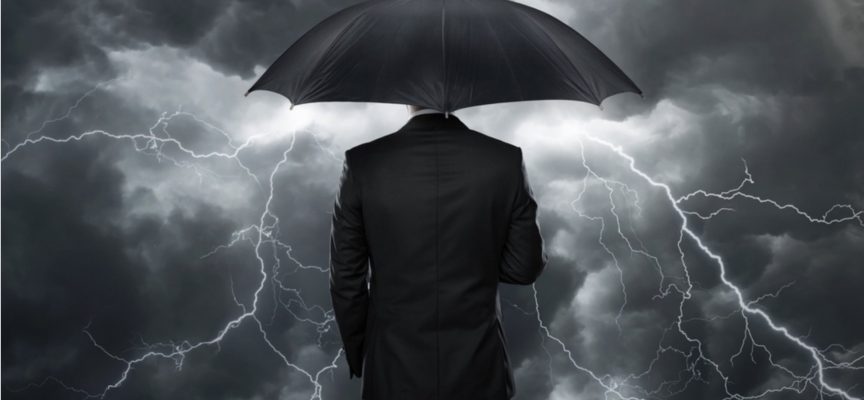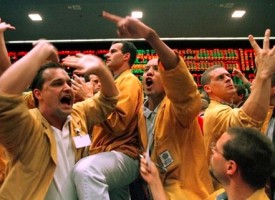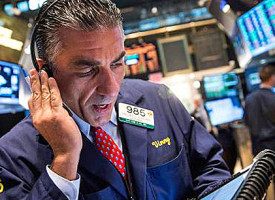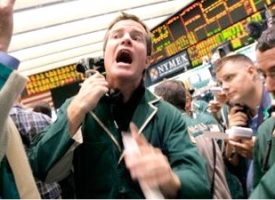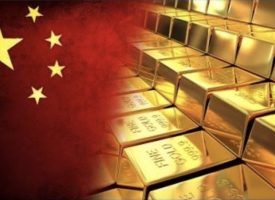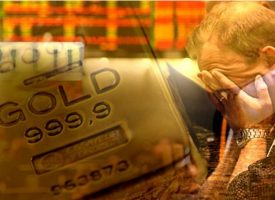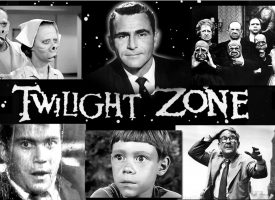With worries mounting in global markets, two of the greats discuss the Coronavirus panic plus some surprises.
January 30 (King World News) – Peter Boockvar: That 3 month/10 yr Treasury yield is now down to just 1.5 bps vs 18 bps one week ago when many of us never heard of the corona virus. That spread though was 32 bps the week before an agreement in principle was reached between the US and China back in mid December. So some of this narrowing is certainly due to worries about the virus but also on the belief within the Treasury market that a growth inflection higher of note in 2020 is not going to happen. Throw in there too the Fed’s large scale asset purchase program and its influence.

As seen in yesterday’s II data when the rate of bullishness cooled off, the same happened within the AAII figures. Bulls fell 13.6 off the highest level since early October 2018 at 45.6 last week. Bears rose 12.1 pts to 36.9 off a 3 week low. Bottom line, as of mid week last week, bullishness got extreme, particularly in the Citi Panic/Euphoria index and it is quite amazing how in past instances when it does, something comes out of the blue to knock things back. While we are living in a financial and economic world where things are different this time, aka negative interest rates, one thing will NEVER change and that is human nature, aka fear and greed.
While old news at this point with what’s going on with the spreading virus, Hong Kong said its exports in December rose 3.3% y/o/y, a bit better than the estimate of up 2.7%. That breaks a 13 month losing streak and does follow an easy comparison as exports fell 5.8% y/o/y in December 2018. Exports in particular to China jumped by almost 16%. Imports were lower by 1.9% y/o/y as expected. Bottom line, easier comps and signs of stabilization contributed to the December lift in exports but we know we can throw this data out the window as the economic impact of the virus has taken over. The Hang Seng fell 2.6% overnight.
The Euro area Economic Confidence index for January rose 1.5 pts m/o/m to 102.8 and that was 1 pt better than expected. It still remains well below the cycle peak of 114.6 back in December 2017 but hopefully it’s carving out a bottom. Finally the improvement was led by a less worse manufacturing sector and another lift in construction which is getting helped by microscopic interest rates. Consumer confidence on the other hand held at the weakest level since September 2016. Don’t look to Europe for much growth this year as expectations are for about a 1% increase in GDP, similar to the pace seen in 2019. The euro is little changed but bond yields are falling along with everyone else’s. The Euro STOXX 600 is back to unchanged on the year.

While we know the German economy has been hard hit by the manufacturing and trade slowdown, the consumer has hung in as the unemployment rate remained at the lowest level since reunification 30 years ago at 5% in January. The number of unemployed fell by 2k instead of rising by 5k as expected. A spokesperson at the German Labor Agency said “The economy’s weak phase continues to leave its mark, but overall the labor market proved itself robust at the start of the year.”
As for unemployment for the entire Eurozone, the rate fell to 7.4% in December from 7.5% in November. That is now just one tenth from the pre recession level back in 2007. It is quite amazing that the world has DEFCON 1 monetary policy while unemployment rates are so low.

We await at 7am est whether the Bank of England will cut rates or not. Their unemployment rate is at the lowest level since 1975. I’m going to be traveling when the news hits (and likely won’t be writing on jobless claims and GDP either) but I hope they wait to see how things play out with the Brexit trade negotiations this year. That said, this virus, however temporary with its economic impact, might scare them into cutting. Either way, whether their benchmark rate is .50% or .75%, it will have no impact whatsoever on economic behavior and if anything, the closer they get to zero, the harder it will be to eventually get away from it. Just ask Haruhiko Kuroda and Mario Draghi.
Art Cashin on Coronavirus and more…
Art Cashin: On this day in 1835, President Andrew Jackson was being helped along as he was leaving the funeral of Rep. Warren Davis at the Capitol Building. It was a damp and cold day and Jackson now old and not in the best of health looked whipped.
Suddenly, out from behind a column sprang a young man cloaked in black. He raised his right arm, aimed at Jackson (six feet away), and pulled the trigger on a pistol. The gun misfired.
Jackson may have had a war flashback. At any rate, he forgot his age and arthritis and went after the assailant with his cane. The assailant, Richard Lawrence, raised his left arm and fired a second pistol – it too failed to go off. Jackson clubbed Lawrence to the ground.
When Lawrence was brought to trial, he claimed that he was Richard III of England and that Jackson had embezzled the Treasury of Britain. So the District Attorney from Washington D.C. decided to drop the charge from attempted assassination to assault. Then he declared that Lawrence was probably a few pickles short of a barrel and therefore should spend the rest of his days in paper slippers. Thus, ended the first attempted assassination of a U.S. President. Oh yeah! The D.A. who lowered the charges – he was a guy named Francis Scott Key – who wrote something famous, I think.
The bulls began the day with high hopes but soon became bewildered enough to lead to donning paper slippers on their own.
Stocks rallied on the opening bell mainly on solid earnings reports from the likes of Apple, Boeing and McDonald’s. But within minutes of the opening pop, traders seemed to rethink their early bullishness as weaker economic data began to offset the stronger earnings reports.
In particular the trade data and pending home sales weighed on the markets and seemed to propel some to cut their projections for this morning’s GDP numbers.
After the release of the Pending Home Sales at 10:00, the S&P and Nasdaq slipped into negative territory.
The bulls quickly regrouped, however, and by 11:00, stocks had regained nearly two-thirds of its fall from the highs. Stocks then cruised sideways, awaiting the Fed statement at 2:00.
At 1:30, the bulls decided to restart the rally in anticipation of a dovish result.
Stocks briefly extended the rally on the release of the statement and then went into “pause” mode awaiting comments from Fed Chair Powell.
When Powell began speaking, yields began to inch lower but stocks moved lower also. Powell was dovish, but in a way that seemed to underscore concerns about the economy going forward.
After Powell finished speaking, they tried to restart the rally in stocks but that effort got quickly overwhelmed by market on close indications of over 2 billion dollars for sale on the bell. Since it was the second day of well over a billion dollars to sell, it sparked some rumors of some pension funds having to liquidate some positions going into the end of the month. They remained just rumors, however, since no one could come up with a probable cause for such liquidations nor could anyone point to a specific fund or group of funds.
Overnight And Overseas – While Shanghai remains closed for the Lunar New Year holiday, other Asian equity markets got banged as the World Health Organization called an emergency meeting on the spreading coronavirus. Tokyo closed down the equivalent of 500 Dow points, while Hong Kong got dinged the equivalent of 750 Dow points. India was off but far more moderately.
European markets are also under pressure with Paris leading the way on the downside.
Among other assets, Bitcoin is slightly firmer, now trading around $9350. Gold is a bit firmer but crude is lower on renewed virus fears. WTI is trading around $52.25. The euro is a touch higher against the dollar. Yields are a shade lower.
Consensus – The call for an emergency meeting of the World Health Organization has spooked global markets. The virus is spreading much more quickly than SARS but is far less virulent and remains mostly confined within China.
It does, however, seem to be putting real pressure on the Chinese economy, which may have some spillover effect on the global economy itself.
If the selling in stocks accelerates, the bulls will need to hold the lows seen Monday morning. Stick with the drill – stay wary, alert and very, very nimble.
Multi-Billionaire Hugo Salinas Price On China & Gold
ALSO RELEASED: Multi-Billionaire Hugo Salinas Price Says Lords Of Money Pushing Global Turmoil But Wildcard China May Return To Gold CLICK HERE TO READ.
KWN has now released a great interview where Bill Fleckenstein discusses what to expect in the gold market, the stock market, bond market, commodities and much more and you can listen to it by CLICKING HERE OR ON THE IMAGE BELOW.
© 2020 by King World News®. All Rights Reserved. This material may not be published, broadcast, rewritten, or redistributed. However, linking directly to the articles is permitted and encouraged.

